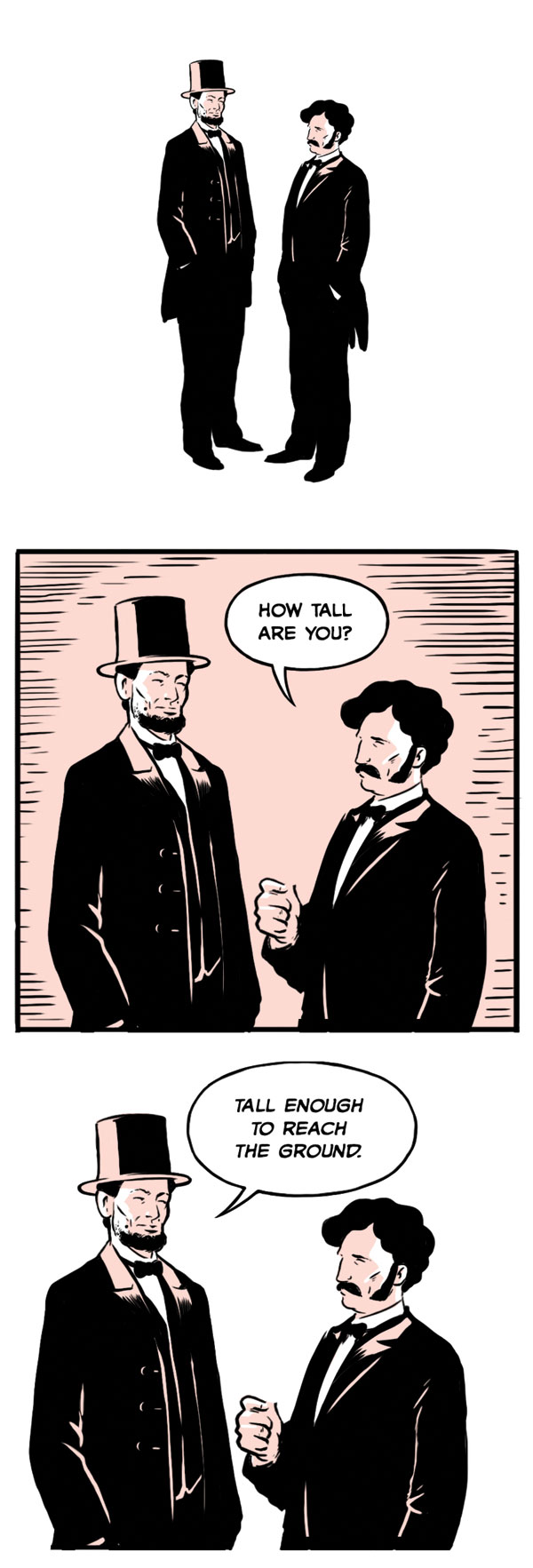Lincoln as Jokester

The most famous of all debates in American history are the seven between Abraham Lincoln and Stephen A. Douglas campaigning in Illinois in 1858 for a Senate seat. On one occasion, Douglas attempted to buffalo Lincoln by making allusions to his lowly start in life. He told a gathering that the first time he met Lincoln, it had been across the counter of a general store in which Lincoln was serving. “And an excellent bartender he was too,” Douglas concluded.
When the laughter died away, Lincoln got up and quietly riposted, “What Mr. Douglas has said, gentlemen, is true enough: I did keep a general store and sold cotton and candles and cigars and sometimes whiskey, but I particularly remember that Mr. Douglas was one of my best customers. Many a time I stood on one side of the counter and sold whiskey to Mr. Douglas on the other side. But now there’s a difference between us: I have left my side of the counter, but he sticks to his as tenaciously as ever!”
Today, not many are aware that Lincoln had a subtle, and sometimes biting, sense of humor. A contemporary wrote, “When Lincoln tells a joke in a fireside group, his face loses its melancholy mask, his eyes sparkle and his whole countenance lights up.” He referred to laughter as “the joyful, beautiful, universal evergreen of life.” Some other prime examples of Lincoln’s humor:
A guest at a reception told Lincoln that in his home state people said that the welfare of the nation depended on God and Abraham Lincoln. “You are half right,” said Lincoln.
While in office, he was asked about what it was like to be president. Lincoln answered, “I’m like the man who was tarred and feathered and ridden out of town on a rail. When they asked him how he felt about it, he said that if it weren’t for the honor of the thing, he would rather have walked.”
Lincoln could impale an opponent with a humorously turned phrase or analogy. “He can compress the most words into the smallest idea of any man I ever met,” said Lincoln of a political foe.
During one of the Lincoln-Douglas debates, Douglas accused Lincoln of being two-faced. Replied Lincoln calmly, “I leave it to my audience: If I had two faces, would I be wearing this one?”
The president was a gangly man who topped out at six feet four inches. To the inevitable question “How tall are you?” Lincoln would reply, “Tall enough to reach the ground.”
Early in the Civil War, the president became angered by General George B. McClellan’s refusal to attack General Robert E. Lee in Richmond. He wrote the general a one-sentence letter: “If you don’t want to use the army, I should like to borrow it for a while. Yours respectfully, A. Lincoln.”
Later, a temperance committee visited the president and asked him to fire General Grant. Surprised, Lincoln asked why. “He drinks too much,” answered the spokesman for the group. “Well,” said Lincoln. “I wish some of you would tell me the brand of whiskey that Grant drinks. I would like to send a barrel of it to every one of my other generals.”